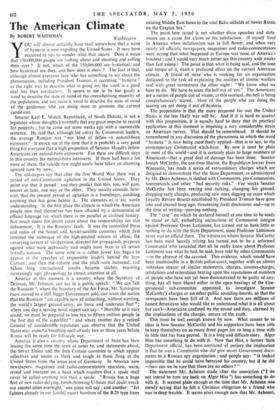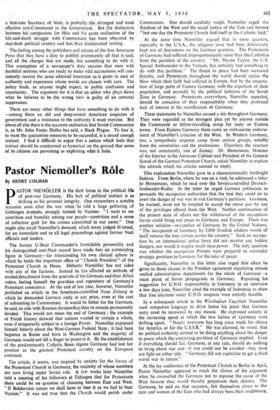The American Climate
By ROBERT WAITHMAN Washington YOU will almost certainly have read somewhere that a wave of hysteria is now engulfing the United States It may have occurred to you to wonder what that means. Does it mean that 150,000,000 people are rushing about -and shouting and rolling their eyes ? If not, which of the 150,000,000 are hysterical, and bow hysterical are they, and how does it show ? The fact is that, although almost everyone here who has something to say about the phenomenon, including President Truman, is accepting " hysteria " as the right way to describe what is going on, the word is a good deal less than satisfactory. It seems to me to be too gaudy a -word to describe the state of mind of the overwhelming majority of the population, and too naive a word to describe the state of mind of the gentlemen who are doing most to promote the current conditions.
Senator Karl E. Mundt, Republican, of South Dakota, is not a legislator whose thoughts I normally feel any great impulse to record for posterity ; but he came out some weeks ago with a memorable sentence. He said that, although led astray by Communist leaders, the average Russian was " our kind of fellow—a natural-born extrovert." It struck me at the time that it is probably a very good thing for everyone that a high proportion of Senator Mundt's fellow Americans are natural-born extroverts. For these are difficult days in this country for natural-born introverts. If there had been a lot more of them, the suicide rate might easily have taken an alarming upward turn by now.
The old-stagers say that after the first World War there was a period of anti-Communist agitation in the United States. They point out that it passed ; and they predict that this, too, will pass, sooner or later, one way or the other. They usually concede, how- ever, that the present period of agitation is a humdinger, outdoing anything that has gone before it. The elements of it are worth understanding. In the first place the climate in which the American people now find themselves has been affected by a debasement of official language for which there is no parallel in civilised history. Not much room for doubt exists about the responsibility for this debasement. It is the Russians' fault. It was the controlled Press and radio of the Soviet and Soviet-satellite countries which first invented the technique of the high-pitched scream of abbse, the unvarying torrent of vituperation, directed for propaganda purposes against what were technically and might have been in all senses friendly nations. The same note in a rather lower key begat to appear in the speeches of responsible leaders behind the Iron Curtain ; and then the volume and the pitch were increased, and Wore long international insults became clicMs, requiring increasingly ugly phraseology to attract attention at all.
America at this moment is a country where the Secretary of Defence, Mr. Johnson, can say in a public speech :'" We can lick the Russians "; where the Secretary of the Air Force, Mr. Symington (now moved to a still bigger Government job), can warn the nation
that the Russians " are capable now of unleashing, without warding, the world's largest ground army, air force and underseas fleet " ;
where one day a serving naval expert can say: "Horrible as it may
sound, we must be prepared to lose ten to fifteen million people in the first day of the superblitz" ; and where another day a retired General of considerable reputation can observe that the United States may expect a breathing-spell of only two or three years before Russia will be ready for full-scale war.
America is also a country whose Department of State has been issuing for some time the texts of notes to, and statements about, the Soviet Union and the Iron Curtain countries in which appear adjectives and nouns as bleak and tough as those flung at the United States from the areas east of Germany. In America now newspapers, magazines and radio-commentators speculate, warn,
reveal and interpret on a basis which requires that a spade shall never be called anything less than a spade. " Russia has a huge fleet of new radar-defying, bomb-throwing U-boats that could wreck our coastal cities overnight," one piece will say ; and another: " Jet fighters already in use [could] escort bombers of the B-29 type from
existing Middle East bases to the vital Baku oilfields of Soviet Russia on the Caspian Sea."
The point here raised is not whether these speeches and state- ments are a cause for alarm or for satisfaction. (I myself lived
in America when isolationism was in full flower, and when very nearly all officials, newspapers, magazines and radio-commentators were saying that what happened in Europe was none of America's business ; and I would very much rather see this country wide awake than fast asleep.) The point is that what is being said, and the tone and tempo of it, exert a profound effect on the current American climate. A friend of mine who is working for an organisation dedicated to the task of explaining the realities of atomic warfare said with great earnestness the other night: " We know what we have to do. We have to scare the hell out of 'em." The Americans are a nation of people opt of whom, at this moment, the hell is being comprehensively scared. Most of the people who are doing the scaring are not doing it out of hysteria.
The proposition is that the more prepared for war the United States is the less likely war will be. And if it is hard to quarrel with this proposition, it is equally hard to deny that its practical application at this moment is imposing a very considerable strain on American nerves. That should be remembered. It should be remembered in any discussion of the phenomena to which the word " hysteria " is now being most freely applied—that is to say, to the contemporary Communist witch-hunt. By now it must be plain to most of the world—and it is certainly plain to large numbers of Americans—that a great deal of damage has been done. Senator Joseph McCarthy, the one-time Marine, the Republican lawyer from Wisconsin, has made a series of extraordinary charges which are designed to demonstrate that the State Department, as administered by Mr. Dean Acheson, is riddled with Communists, pro-Communists, homosexuals and other " bad security risks." For weeks Senator McCarthy has been veering and tacking, changing his ground, dropping early charges, producing new ones, digging up cases which Loyalty Review Boards established by President Truman have gone into and cleared long ago, threatening fresh disclosures and—up to the time of writing—proving nothing.
The " case " on which he declared himself at one time to be ready to stand or fall, embodying accusations of Communist intrigue against Professor Owen Lattimore, has turned out to have little or nothing to do with the State Department, since Professor Lattimore never was an official there. The witness on whom Senator McCarthy has been most heavily relying has turned out to be a reformed Communist who conceded that all he really knew about Professor Lattimore was what he had, he said, been told by other Communists —in the absence of the accused. This evidence, which would have been inadmissible in a British police-court, together with an almost unbroken stream of similar statements, charges, counter-charges, refutations and reiterations bearing upon the reputations of numbers of people who have not yet been demonstrated to be guilty of any- thing, has all been blared either in the open hearings of the Con- gressional sub-committee appointed to investigate Senator McCarthy's charges or on other public sounding-boards, so that the newspapers have been full of it. And now there are millions of honest Americans who would like to understand what it is all about but can't—Americans confused by the sound and fury, alarmed by the implications of the charges, unsure of the truth.
This must be well enough known by now. What cannot be so clear is how Senator McCarthy and his supporters have been able to keep themselves on so many front pages for so long a time with so little that has been proved. It is a long and difficult story. Alger Hiss has something to do with it. Now that Hiss, a former State Department official, has been convicted of perjury the implication is that he was a Commumist who did'give secret Government docu- ments to a Russian spy organisation ; and people say: " It looked impossible that he could have betrayed his country, but if he did —how can we be sure that there are no others ? "
The statement Mr. Acheson made after the conviction ("I do not intend to turn my back on Alger Hiss ") has something to do with it. It seemed plain. enough at the time that Mr. Acheson was merely saying that he felt a Christian obligation to a friend who was in deep trouble. It seems plain enough now that Mr. Acheson,
a first-rate Secretary of State, is probably the strongest and most effective anti-Communist in the Government. But the distinction between his compassion for Hiss and his acute realisation of the life-and-death struggle with Communism has been obscured by slap-dash political oratory and less than disinterested writing.
The feeling among the publishers and editors of the free American Press that they have a duty to publish prominently all that is said, and all the charges that are made, has something to do with it. This conception of a newspaper's duty ensures that men with doubtful motives who are ready to make wild accusations will con- sistently receive the same editorial treatment as is given to men of authority and experience whose words are chosen with care. The policy leads, as anyone might expect, to public confusion and uncertainty. The argument for it is that an editor who plays down what he believes to be the wrong view is guilty of an unmoral suppression.
There are many other things that have something to do with it —among them an old and deep-rooted Arherican suspicion of government and a resistance to the authority it must exercise. But above all else there is the accurate realisation that Soviet Communism is, as Mr. John Foster Dulles has said, a Black Plague. To fear it, to want the quarantine measures to be successful, is a sound enough instinct. I find it difficult to argue that a nation which feels that instinct should be condemned as hysterical on the ground that some of its citizens are perverting or exploiting what it feels.







































 Previous page
Previous page